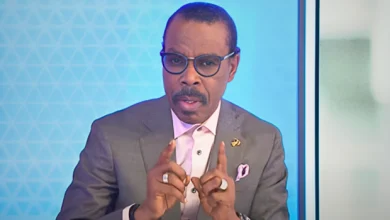NESG v CBN: Beyond the Battleground

Introduction- Beyond The Exchange, Brothers at War
Officials at the Central Bank of Nigeria (CBN) are cerebral, nationalistic, and focused. But they are equally prickly, defensive, and impatient with alternative views. The recent public brickbat between Nigeria’s banking sector regulator and the country’s premier private-sector economic think tank, the Nigeria Economic Summit Group (NESG) reflects the passion and overwhelming concern both institutions have for the wellbeing of the Nigerian economy.
However, the two institutions like squabbling siblings have exhibited barely restrained emotion, veiled intolerance, and an unnecessary desire for public-validation. The difference of opinion between both institutions could have been resolved undramatically with forbearance, temperance, and a preparedness to listen rather than speak.
Indeed, the sword-rattling between the two institutions signposts the unraveling of a long-standing friendship that existed between the two previous buddies which perhaps helped the organizations ignore the floating smoke coming from the economy’s engine. The fact that the NESG has only just become aware of the dangers of a few economic headwinds is just as significant (and frustrating) as the private think tank pointing out the problems of the economy to its regulator associate. The NESG’s once-comfortable relationship with the CBN had created an illusory sense of social, and economic wellbeing.
The Issues (and Egos)
Established in 1996, the NESG has been a major platform for the organized private sector’s engagement with the economy and its state actors. Perhaps concerned about rising domestic inflation rate (+13.22% in August 2020), rising unemployment rate (+ 27.1% in Q2 2020) and falling GDP (-6.10% in Q2 2020) the NESG felt a need to express its opinion on the increasingly adverse macroeconomic aggregate numbers.
The NESG set out a 15-point argument for the government to take action on what the body considered a dangerous drift in the economy. The NESG’s summation was generally well-received outside government circles as it addressed points that academics and entrepreneurs had previously felt nervous about.
In a speedy and abrasive response to the NESG, the banking sector regulator, riled by NESG’s gale to go public with a communique titled “Matters of urgent Attention” let loose a spitfire of information on its intervention measures. The money market regulator insisted that the NESG would have behaved more appropriately if a memo was sent privately to the Bank. In a paragraph of a press release signed by the regulator’s retiring Director of Communications, Mr. Isaac Okoroafor, the Bank noted that “The CBN also feels compelled to let Nigerians know that despite the cordial and open relations between both organizations, the NESG could have raised its allegations directly with us but never did. Instead, they chose to release a Press Statement, having leaked its content to a leading Business Newspaper in the country”. If the NESG had according to the CBN’s response to the think tank’s communique, issued a press statement, it is difficult to understand how such a release could have been ‘leaked’ since the intention of a Press release is to make the information public. A Press statement to all intents is drafted to be made public and is unlikely to have been passed quietly to a media house under the cover of the night. But this is a minor point. Of greater importance is that as a think tank, like the United States of America’s The Brookings Institution, and Japan’s Nomura Research Institute, the NESG is not required to have backdoor discussions with governments or their agencies before making press statements or communique. Economic observers note that while a fraternal relationship with public institutions is desirable it is neither inevitable nor compulsory. The job of the NESG is to provide a compelling interpretation of unfolding economic reality as accurately and dispassionately as possible in the interest of both private and public sector stakeholders, it is not a black- suite fraternity sworn to an oath of public secrecy. In this respect, the CBN may have misinterpreted the NESG’s purpose and methods in deciding what it sees as acceptable conduct.
However, the NESG could have, admittedly, handled the communication gap between itself and the CBN better. The economic body could have given the CBN a heads-up as an act of courtesy and left it at that. Both institutions appear to have had some festering grievances that plays-up in the adversarial language and actions surrounding the events after the NESG communique was released. The battle between the CBN and the NESG is brilliant for neutrals who wish to see clarity in economic policy formulation and management but it would have been much better if the egos of both institutions and their managers were less fragile and provided better economic insight.
A local economic analyst noted that “relationships never die a natural death. They are always murdered by attitude, behaviour, ego or ignorance”, the NESG and the CBN may need to decide which of the vices apply. But more importantly, both bodies need to take to the words of Ayn Rand in her novel ‘Atlas Shrugs’, where observed that “There are two sides to every issue: one side is right and the other is wrong, but the middle is always evil. The man who is wrong still retains some respect for truth, if only by accepting the responsibility of choice. But the man in the middle is the knave who blanks out the truth in order to pretend that no choice or values exist, who is willing to sit out the course of any battle, willing to cash in on the blood of the innocent or to crawl on his belly to the guilty, who dispenses justice by condemning both the robber and the robbed to jail, who solves conflicts by ordering the thinker and the fool to meet each other halfway.”
“In any compromise between food and poison, it is only death that can win. In any compromise between good and evil, it is only evil that can profit. In that transfusion of blood which drains the good to feed the evil, the compromise is the transmitting rubber tube”.
Of Righteous Resignations and Sinful Pressure Points
Riding on the back of pricked egos, recent media reports speculate that three bank managing directors resigned their board membership of the NESG ostensibly because the communique released by the organization was not widely circulated for comments and approval of board members. Independent investigations suggest that the MDs of banks on the board of the NESG were pressured by the regulator to resign their appointments if they hoped to continue to have a smooth working relationship with the regulator. The CBN’s heavy-handedness rather than righteous indignation has been claimed to be the more plausible reason behind the local deposit money institutions (DMBs) executives resigning from the NESG. If this were true it would mark a dark day in the annals of corporate governance in Nigeria’s financial service sector.
For the CBN to allegedly lean on bank executives in retaliation to a scuffle with third-parties breeches the principles of global best management practice by the banking regulator and those bank executives that decided to resign. The CBN’s alleged action would represent bullying while those of the bank executives would reflect rank cowardice.
There is no point in joining an economic policy and research association in your free will only to cave-in to the whims and caprices of regulatory overreach. The whole point of an economic private sector association is to provide a platform where economic interests can be canvassed within a framework of reasoned engagement rather than muddy sentiments, if bank CEOs cannot stand up and own a principled position based on potential and temporary material loss, then the NESG may well be considered better off without such fellows. There is no documentary evidence to indicate that the bank CEOs that resigned from the NESG were harassed or subtly threatened but the excuse that they were not consulted or a party to the NESG’s communique as a reason for resignation is like a child refusing to eat a meal prepared by its mother because she did not allow him to add a dash of salt during its preparation.
A child could be excused of emotional fragility, but for adults to portray whimsical behaviour based on a claim of not being consulted on the contents of an association’s letter is puzzling. Supposedly neutral analysts have noted that if the bank CEOs were genuinely aggrieved by the contents of the NESGs communique the way of wizened elders would be to write a joint memo to the market and explain that they had an alternate view of the economy and a less deprecating opinion of the state actors who manage the country’s money supply and treasury.
The ‘minority report’ approach would have added robustness to the overall debate on the quality of economic management in the country and would have provided fresh perspectives on how to engineer and sustain growth, development, and success. Analysts observe that the brainstorming would have brought about light from within the smoke, and created more useful insights than the dramatics of penning resignations with the attendant unhealthy speculations. BY PROSH






